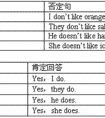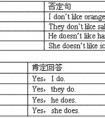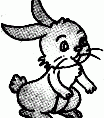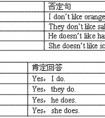按要求写句子。1. I like PE.(改为否定句)__________________________________________________2. He cannot do exercise well. (改为肯定句)_________________________-五年级英语
题文
| 按要求写句子。 |
| 1. I like PE.(改为否定句) __________________________________________________ 2. He cannot do exercise well. (改为肯定句) __________________________________________________ 3. Nancy has seven lessons every day.(对画线部分提问) __________________________________________________ 4. Mike jumps high.(改为一般疑问句) __________________________________________________ 5. My sister dances beautifully.(改为一般疑问句) __________________________________________________ 6. There are many computers in the reading room.(写出同义句) __________________________________________________ 7. Do you take photos on Sundays?(用Su Yang作主语改写句子) __________________________________________________ |
答案
| 1. I don't like PE. 2. He can do exercise well. 3. How many lessons does Nancy have every day? 4. Does Mike jump high? 5. Does your sister dance beautifully? 6. There are a lot of computers in the computer room. /There are lots of computers in the computer room. 7. Does Su Yang take photos on Sundays? |
据专家权威分析,试题“按要求写句子。1. I like PE.(改为否定句)___________________..”主要考查你对 一般疑问句,形容词,一般现在时,动词单数第三人称,助动词,肯定句,否定句 等考点的理解。关于这些考点的“档案”如下:
一般疑问句形容词一般现在时,动词单数第三人称助动词肯定句否定句
考点名称:一般疑问句
- 一般疑问句:
是疑问句的一种。它是以be动词,have或助动词、情态动词开头,用yes(是)或no(否)来回答的句子。
其结构是:系动词be/助动词/情态动词+主语+其他成分
一般疑问句的肯定形式为:
助动词+主语(+实义动词)。肯定答语用“yes+可定结构”。
一般疑问句的否定形式为:
助动词构成的缩写否定词+主语(+实义动词)。否定答语用“no+否定结构”。
例:
— Do you like this story-book? 你喜欢这本故事书吗?
— Yes, I do. 喜欢。/ No, I don’t. 不喜欢。
— Is he a student? 他是一名学生吗?
— Yes, he is. 是,他是。/ No, he isn’t. 不,他不是。 一般疑问句的改写:
一、含有be动词的一般疑问句,通常把be动词调到句首。例如:
陈述句:They are in the swimming pool.
一般疑问句:Are they in the swimming pool?
注意:一般疑问句句末要用“?”。
二、含有情态动词的一般疑问句(can, may...),把情态动词调到句首。例如:
陈述句:He can drive a car.
一般疑问句: Can he drive a car?
三、含有have的一般疑问句,have译为“有”。一般疑问句式有两种形式:
1.把have/has调到句首。例如:
陈述句:Tommy has a computer.
一般疑问句:Has Tommy/he a computer?
2.加助动词do/does,第三人称单数用does,其他人称用do。其句型为:Do/Does + 主语 + have...?
例如上句可变为: Does Tommy have a computer?四、一般动词的一般疑问句,也要借助助动词do/does,第三人称单数用does,其余人称用do。
其句型为:Do/Does + 主语 + 动词原形+其它?
陈述句:Amy speaks English.
一般疑问句:Does Amy speak English?一般疑问句的回答:
首先要有人称的改变。当主语为名词时,在答语中要改成其相应的代词。
另外,答语有两种,肯定的回答(用yes)和否定的回答(用no),否定式常用缩写形式。
现在还是让我们分句型一一说明。一、一般疑问句含be动词时,用be动词回答,句末用句号。例如:
-Is Mary your sister?
-Yes, she is. / No, she isn’t.(缩写)二、一般疑问句含有情态动词(can, may, should等)时,用情态动词回答。例如:
-May I come in?
-Yes, you may. / No, you can’t.三、一般疑问句含有have(译为“有”)时,有两种回答方式。
1.直接用have/has回答。
例如:
-Have they any pictures?
-Yes, they have. / No, they haven’t.
2.用助动词do/does回答。
例如:
-Does Millie smoke?
-Yes, she does. / No, she doesn’t.四、一般动词的一般疑问句回答时也用助动词。
例如:
-Do the workers live in London?
-Yes, they do. / No, they don’t.
考点名称:形容词
- 用来修饰或描述名词(或代词),表示人或事物的性质、状态和特征的词。形容词有三个比较等级:原级、比较级和最高级。
形容词的判断方法:?<?xml:namespace prefix = "o" ns = "urn:schemas-microsoft-com:office:office" />
判断一个词是不是形容词,可以从其结构特点和句法特点两方面来确定。?
(1)结构特点:?
以-able,-al,-ful,-ic,-ish,-less,-ous,-y等后缀结尾的词,一般是形容词,如:
changeable(多变的),medical(医学上的),careful(仔细的),atomic(原子的),foolish(愚蠢的),careless(粗心的),delicious(美味的),healthy(健康的),rainy(下雨的)等。?
(2)句法特点:?大多数形容词都可以作定语;在be,look,seem等词之后作表语;可用very来修饰,有比较级和最高级形式。
其中,在句中作定语或作表语是形容词最主要的特点,如:?Mary is very nice.玛丽很可爱。(表语)?
- 最新内容
- 相关内容
- 网友推荐
- 图文推荐
| [家长教育] 孩子为什么会和父母感情疏离? (2019-07-14) |
| [教师分享] 给远方姐姐的一封信 (2018-11-07) |
| [教师分享] 伸缩门 (2018-11-07) |
| [教师分享] 回家乡 (2018-11-07) |
| [教师分享] 是风味也是人间 (2018-11-07) |
| [教师分享] 一句格言的启示 (2018-11-07) |
| [教师分享] 无规矩不成方圆 (2018-11-07) |
| [教师分享] 第十届全国教育名家论坛有感(二) (2018-11-07) |
| [教师分享] 贪玩的小狗 (2018-11-07) |
| [教师分享] 未命名文章 (2018-11-07) |





![____ it got four wheels?[ ]A. Have B. There C. Has-五年级英语](http://www.00-edu.com/d/file/ks/4/1/65/2019-08-31/small2ca0aeba76320ba6f81e40fe83a0e8111567199443.png)
